Darel's New Header Photo
12



12
|
Would there be plans for these locos? and that freight train, was that a dual gauge train? if so did the standard gauge locos have dual gauge coupler pockets? love all those people need some more of that era for my layout, who makes them other than railmaster?. Always more questions. Paul R.
|
Denver Union Terminal Railway pdf Online
|
Administrator
|
In reply to this post by John Greenly
I did a search online for what came up as Denver Union Terminal Railway.
It appears that as part of the recent renovation to Union Station, that name is being reused as part of a transportation hub in and out of the Union Station area, including shuttle service to Boulder. The only reference I found of historical relevance was a pdf file linked to Labelle Woodworking, so this is was almost certainly done by Rick Steele. Maybe he can add a few other details such as have been discussed here regarding controlling track and train movements. The DUT Railway was incorporated in 1912, but seems to have been an integral part of planning and construction of Union Station from the beginning. Here is the link to view and/or download the pdf file: https://www.labellemodels.com/manuals/Denver%20Union%20Terminal.pdf It also indicates that in the years after incorporation, the DUT Railway realigned trackage at Union Station, which likely was in part to avoid situations like we are seeing in the photo. |
|
In reply to this post by Paul R.
I speculate that our passengers recently got off the coaches on the track beyond the switcher. The switcher was waiting for them to detrain, and once the conductor gave the signal, the switch engine proceeded on the open track. I bet this train is heading to either the gas plant, or the smelter at Argo.
That was the way it was back in the day. Back when folks wore wool year round and they had a brain to stay out of harms way. or at least most did. Yes, it must be fitted with a 3-way coupler pocket, and the folios are in F. Hol Wagner's book.
Keith Hayes
Leadville in Sn3 |
|
In this crop of the photo you can see two guys in vests, one just at the head of the engine and another further along. Are they looking out to see that all's clear for the engineer to proceed?
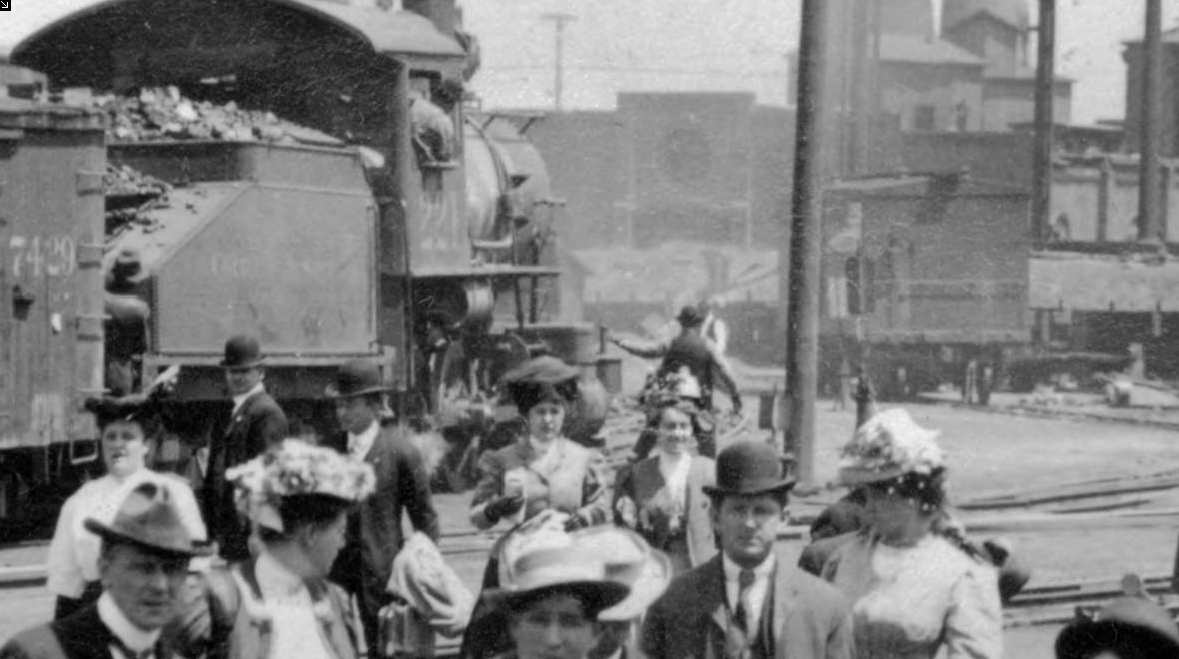 John
John Greenly
Lansing, NY |
|
This post was updated on .
In reply to this post by Paul R.
Paul,
I know of no plans for the first decade C&S standard gauge 0-6-0s of 1906, like 221. However, in August, 1907, the C&S purchased seven near identical engines from Schenectady, numbered 225-231. As the new locomotive class system had been adopted, they were classed A-3E1 at the factory. A folio sheet and builder's photo are in Hol Wagner's book, The Colorado Road: 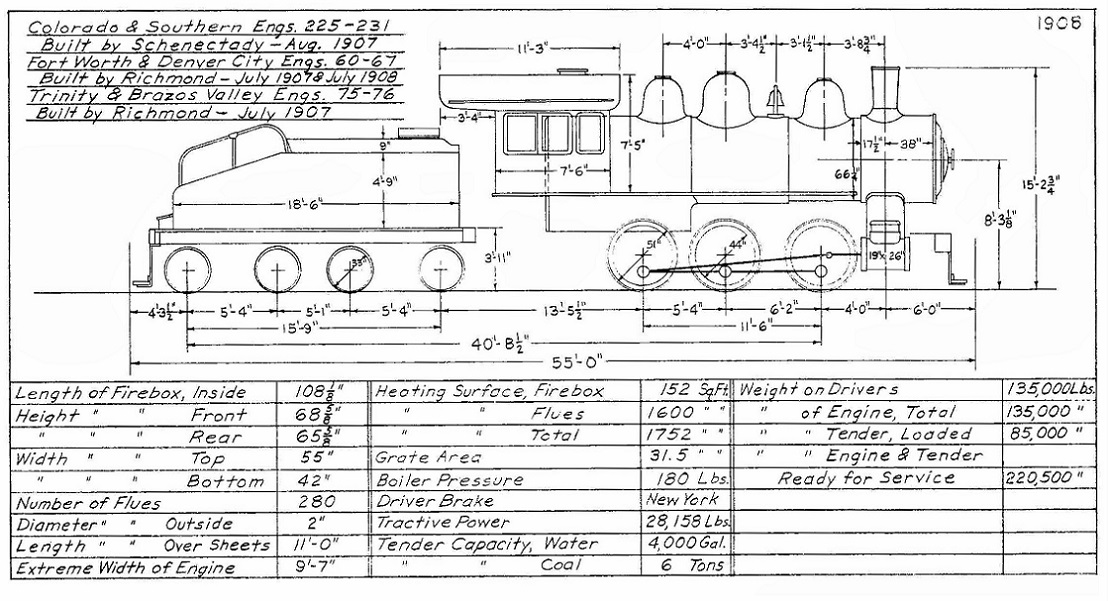 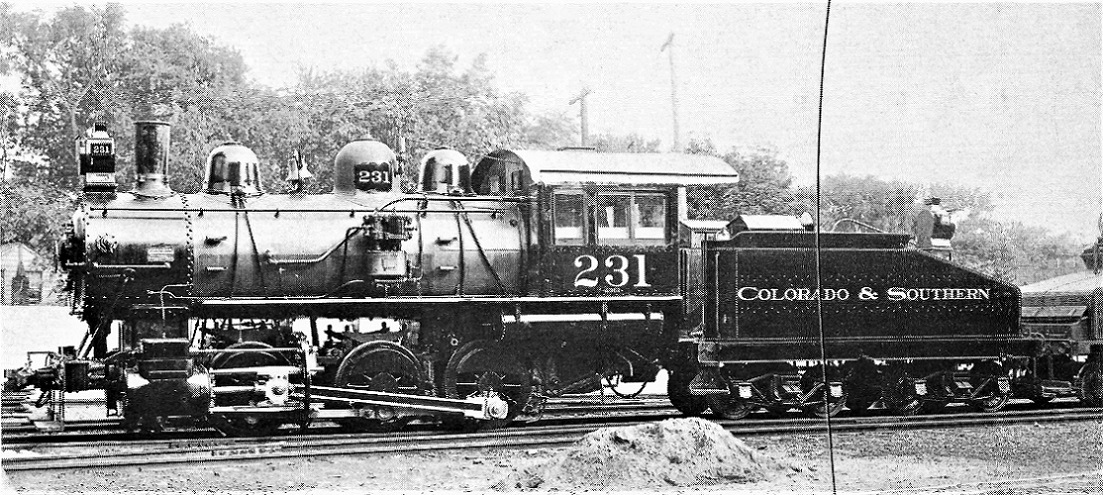 Looks like this second class was delivered with New York double stage air compressors. Hol states in his book that nearly all of the C&S 0-6-0s were assigned to Denver, and until the C&S narrow gauge was abandoned, the 0-6-0s were equipped with three-way and later "sliding" coupler pockets to work the dual gauge Denver trackage. I don't what scale you're modeling in, but since these engines were supposed near duplicates of Harriman Standard 0-6-0s of that era, perhaps a UP or SP 0-6-0 could be the basis for a re-detailing project. And Keith wrote: That was the way it was back in the day. Back when folks wore wool year round and they had a brain to stay out of harms way. About 10 years ago, my wife and I spent a month touring Ireland in a rental car. My friend in Dublin was kind enough to take me out driving the first day, to get use to Irish traffic. At one point, trying to figure out all the different traffic signs ("Calming Ahead", "Fresh Chippings" and the three tiers of "No Parking"), I asked him when pedestrians had the right of way. "Never!" he said, "In Ireland, it's the pedestrians job to stay out of the way of the cars". And wool clothing is still quite popular in Ireland.
Jim Courtney
Poulsbo, WA |
|
In reply to this post by John Greenly
John,
since there is a couple of tardy Passengers stuck behind the low-sided cars, a switchman still on the rear footboards, I'd say this is a switching move or transfer pulling through as the pilot man at the front of the locomotive appears to been snapped stepping off. He certainly isn't mounting the pilot with that body attitude. The furthest vested man could be the switch crew's headman, I'm not certain of US yard crew makeup compared with ours. Certainly it would be not unusual to work around the passenger moves with transfers. A comparison view taken from the Gasworks building in the same area and era. Note the boardwalks to cross the tracks that the Passengers(typically) aren't using in the photo under discussion, and the ng train of excursion cars with power on two tracks over. Also that there is a express wagon backed up at lower right. 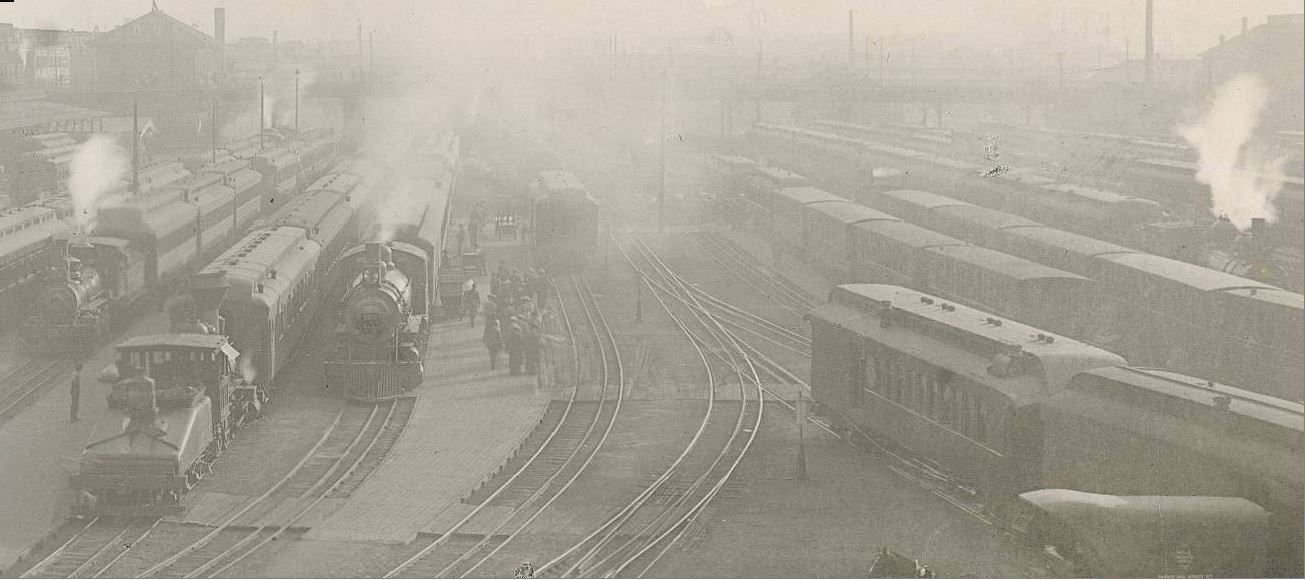 http://digital.denverlibrary.org/cdm/fullbrowser/collection/p15330coll22/id/87361/rv/singleitem
UpSideDownC
in New Zealand |
|
Chris,
I was wondering about that man's posture, looks like he had just lost his balance. that's a great photo too. The dual-gauge trackage is wonderfully complex. I'm trying to figure out where this view would be on the map you posted above, but I can't seem to see it. thanks, John
John Greenly
Lansing, NY |
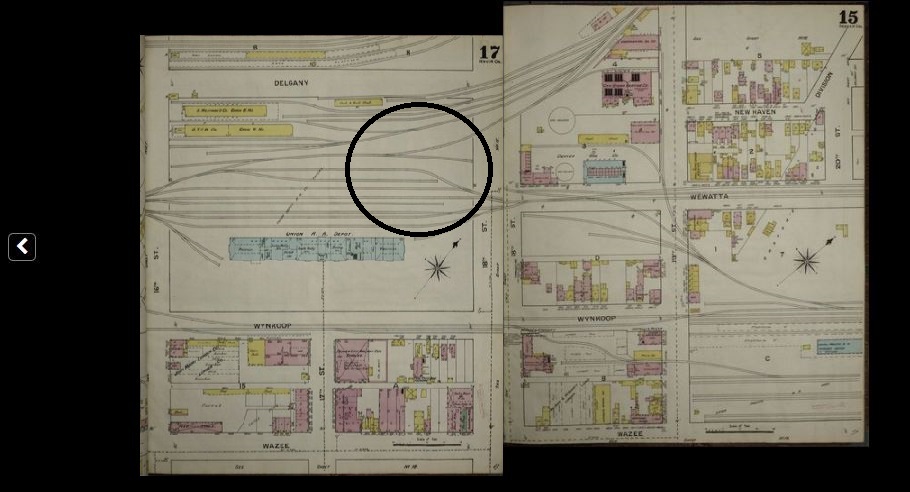 Since I've changed over to win10, I'm having trouble getting into my old links to the Sanborn coll. so I can't access the 1900 map yet.  I'm certain there was quite a number of tracks added and extended since the initial erection of the Denver Union Depot but that trackage layout basically remained the same through the period we are discussing. note the tracks at first weren't all dual gauge 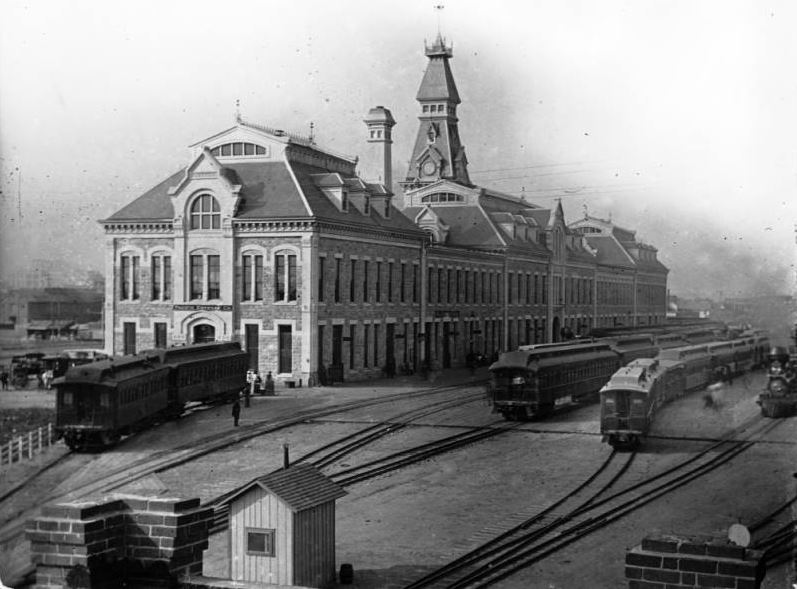 http://digital.denverlibrary.org/cdm/fullbrowser/collection/p15330coll22/id/36468/rv/singleitem/rec/178
UpSideDownC
in New Zealand |
|
In reply to this post by Jim Courtney
Jim,
This would be an S scale project for the future. That plan gives me most of the details to start a drawing with pencil and paper, have not learnt any of the cad progams. Paul R. |
Re: Darel's New Header Photo
|
In reply to this post by Chris Walker
If you look carefully above the station tower you can see the electric Arc light tower that was attached to it starting about 1881-82 and lasting for roughly 10 years This tower would have lit the tracks you noted in the Sanborn maps.There were several other fixtures mounted on tall metal towers throughout Denver including one near the DSP&P Denver roundhouse and yards.These Brush "moonlight towers'' were a temporary solution.Also the Union Station was lit inside beginning about 1881.
|
Re: Darel's New Header Photo
|
Also you can see a Gilbert&Bush car
|
|
This post was updated on .
In reply to this post by Chris Walker
And here is a McClure photo of the Union Station yard about the same time as Darel's header photo, perhaps a bit earlier, c1900:
http://digital.denverlibrary.org/cdm/singleitem/collection/p15330coll22/id/77796/rec/22 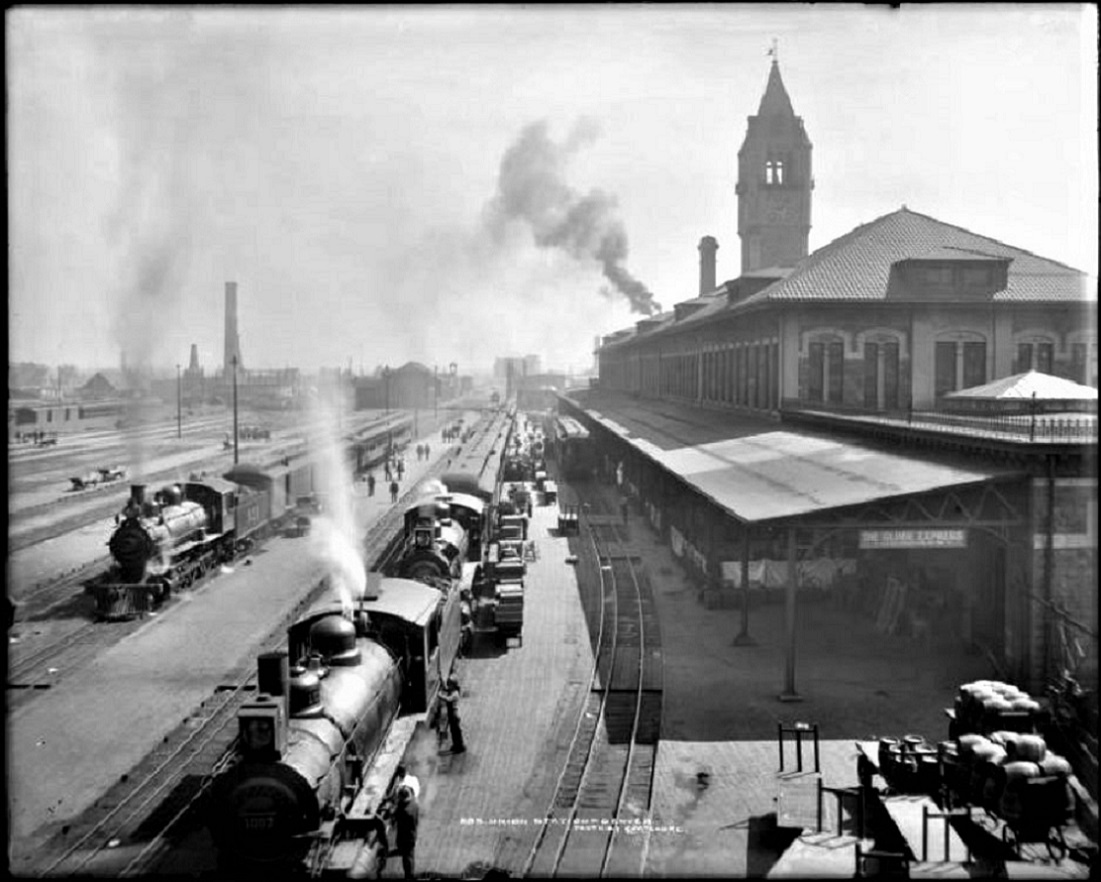 The gas works and chimney(s) are to left of center distance. You're looking left to right down Chris's two page Sanborn map. Per DPL's caption: Union Station with southbound Colorado and Southern Railway passenger train and Rio Grande double header passenger train loading; station tracks laid with three rails to accomodate narrow gauge and standard gauge trains; numerous baggage and freight rail carts await loading; wooden barrels stacked on carts right foreground; Globe Express Company sign on railroad platform cover; 19th (Nineteenth) Street grade crossing next to Railroad Mission (building with steeple) distant background; Denver Gas Works (large chimney on left). The platform, that the passengers are crossing in Darel's photo is in the left distance, beyond the cluster of baggage wagons. They've got a long walk to the main station building!
Jim Courtney
Poulsbo, WA |
«
Return to C&Sng Discussion Forum
|
1 view|%1 views
| Free forum by Nabble | Edit this page |

